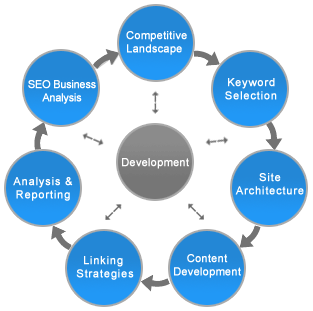
 Keyword Research: This step is stepping stone in the Search engine optimization (SEO) process and should be rated as a step above others. These have to be followed up by finding the keywords or key phrases which involve after they have been chosen. When these become too competitive you should analyze whether it is worth or not worth maximizing. You should involve yourself in the selection of unique keywords or phrases which are easy to be achieved.
Keyword Research: This step is stepping stone in the Search engine optimization (SEO) process and should be rated as a step above others. These have to be followed up by finding the keywords or key phrases which involve after they have been chosen. When these become too competitive you should analyze whether it is worth or not worth maximizing. You should involve yourself in the selection of unique keywords or phrases which are easy to be achieved.
Domain Name Optimization: Once you have identified your main keyword or phrases the next step will emerge which will enable decision of what should be the main name. For optimization of your domain name something short has to be found out targeted as well as positioned for your market needs and sufficient enough for proper explanation of your site.
On-page optimization: Another important step of maximizing your website is maximizing the web pages that the users and spiders inspect. The idea should be to use the best keyword phrase interspersed in your content for enabling maximization as naturally as it is done.
- Title Meta Tag – Title, Description, Keywords, Etc...
- Keywords Density

- Prominence
- Proxymancy
- Internet Linking
- Robots.Txt
- Local Listing
- Website Submit In Search Engines
- Webmaster Tool
- Sitemap.XML
- Sitemap Page
- Website Optimization
- SEO Friendly Website Design
- RSS
On-page factors affecting search engine rankings include:
- Title tags
- Image optimization
- Site maps
- Domain name
- HTML design vs. other coding such as Java and Flash
- URLs
Off-Page Optimization: It is a barricade of success. The search engines want to examine how famous your website is with specific reference to the online world. This strategy involves link popularity as well as exchanges where you can get a proper link up to your website from another site. If you add keyword phrases which are linking the key.
- Directory Submission
- Article Submission
- Press Release News Syndication
- Social Bookmarking
- Social Media Marketing Which Includes Promotion On Facebook, Twitter, Linkedin, Digg, Delicious Etc.
- Blog Creation, Weekly Postings and Blog Promotion
- Content Editing & Rewriting
- Link Exchange
- Image Optimization
- Local and Regional Search Engine Indexing
- Video Marketing
- Comment Posting
- RSS Feed
- Forums Posting
Off-page factors affecting search engine ranking include:
- Incoming links from high page rank sites
- Anchor text links pointing to your site
- The page ranks of websites linking to your site
- The authority of websites linking to your site
Monitoring Search Engine Rankings: Important skills in Search engine optimization (SEO) is the measurement of results of application of SEO techniques as aforementioned.
Webs target: It helps you with your Search engine optimization (SEO) needs because after knowing the process as well as keeping up on the SEO industry changes as well as updates.
Other Activities: Natural Search Engine Optimization is the process of implementing cutting-edge best practices that cope up with the frequently-changing rules established by the leading search engines. These best practices assist a website in demonstrating relevance to the search engines for a pre-determined group of keywords. It's is a process that aligns a website's code and content with strategic keyword phrase targeting, ultimately assisting a search engine algorithm in understanding a website's theme and keyword. SEO can be simple for some websites, while others may require intense keyword density, content, navigation and internal linking changes.
- Google Sitemap Creation & Submission on Google.
- Yahoo Sitemap Creation & Submission on Yahoo.
- Competitor Analysis & Monitoring
- Webmaster Account Setup and Management
- Google Analytics (Statistics) Setup and Management
- PPC Basics
Factors to analyze a website for search engine optimization
- Age of website
- Total pages count within the website.
- Template layout.
- Navigation structure.
- HTML format (XHTML, CSS, etc.)
- On-page content.
- On-page scripting.
- META-data.
- Analyzing keyword density.
- Link Popularity.
- Quality of other websites linking to the website.
Best Practices for Pay per Click Management
- Goal Setting and Tracking
- Keyword Analysis
- Campaign and Network Strategy
- Bidding Strategy
- Ad Creative
- SEO Integration
- Reporting, observations and recommendations
No comments:
Post a Comment